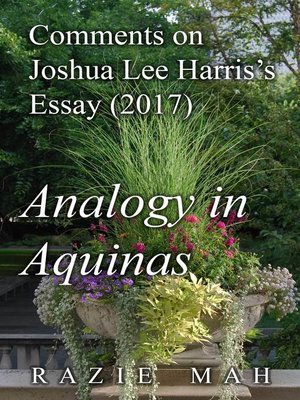Comments on Joshua Lee Harris's Essay (2017) Analogy in Aquinas
ebook ∣ Considerations of Jacques Maritain, John Deely and Thomistic Approaches to the Questions of These Times
By Razie Mah

Sign up to save your library
With an OverDrive account, you can save your favorite libraries for at-a-glance information about availability. Find out more about OverDrive accounts.
Find this title in Libby, the library reading app by OverDrive.



Search for a digital library with this title
Title found at these libraries:
| Library Name | Distance |
|---|---|
| Loading... |
This work comments an essay titled, "Analogy in Aquinas: The Alston-Wolterstorff Debate Revisited". The author is Joshua Lee Harris. The article appears in the January 2017 edition of the Faith and Philosophy: Journal of the Society of Christian Philosophers (34:33-56).Thomas Aquinas's doctrine of analogy has been the focal point of many inquiries. Harris's essay starts with three basics for understanding the doctrine. These are incorporated into a model of actuality as two contiguous elements.Harris then goes over the debate between two modern analytic philosophers, William Alston and Nicholas Wolterstorff. He covers Alston first, then Wolterstorff's response. Harris shows that Alston is closer to the Aquinas than Wolterstorff. At the end, he refutes Alston's argument.All this is well and good. The exposition is clear. However, re-articulating Harris's discussion, in terms of the category-based nested form, messes up that clarity, but with good results. Something becomes apparent.The scholastic semantic triangle contains internal tensions. Alston alters that tension. Then, Wolterstorff reconfigures what Alston accomplished, squeezing the issue of analogy into a narrowly defined frame that tests a particular proposition. Here is the question addressed by this proposition: What properties are shared by both Creator and creature?In sum, the category-based nested form moves Harris's exposition from static analysis into dynamic associations and implications. Features are revealed. They take on lives of their own. Harris's didactic points acquire an evocative, exploratory flavor. Aquinas's doctrine of analogy comes alive, along with the debate, in surprising ways.







